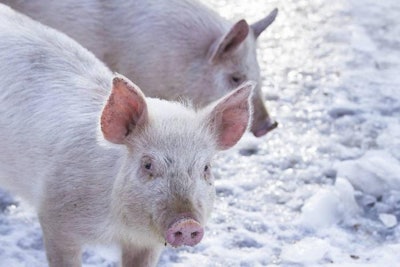
As winter approaches in the Northern Hemisphere, it is important to remember that porcine epidemic diarrhea (PED) virus thrives in cold weather.
Biosecurity is important in preventing PED virus on pig farms. Biosecurity efforts are tri-fold, including:
- Bio-exclusion: Attempts to keep new disease agents out of a location (barn, farm or country) such as excluding entry or quarantine.
- Bio-management: Managing the diseases we have through means of vaccine, timed exposure, antibiotics and sanitation.
- Bio-containment: Management strategies that prevent disease from expanding to other locations.
What can feed mills do?
There are measures feed mills can take to prevent the spread of PED virus:
- Cleaning, sanitizing and disinfecting: The cleaning and disinfecting must be two separate steps. Concentrating on the cleaning first will heighten the effectiveness of disinfectant products.
- Allowing for a window: Make sure delivery trucks as well as drivers going to sites with pigs have at minimum a 72-hour window between each location. However, particularly in cold months, without proper cleaning and disinfection, the window is not effective.
- Heat: When feed is heated properly, the PED virus is inactivated.
- Six days rest: The virus will likely not survive in feed stored in proper drying conditions more than six days.
- Ingredient sourcing: Ask ingredient suppliers where they get their ingredients. Make sure they are not exposed to pigs or pig people.
- Storage: Ensure feed products and ingredients are stored properly in an isolated, dry and heated environment.
- Young swine diets: The normal pelleting process heats feed ingredients 160 to 200 degrees for less than a minute; however, young pig starter diets are pelleted at a much lower heat, increasing the chance of virus survival, if present. While feed mills are limited on their ability to increase heat at risk of losing palatability in starter diets, it’s key to ensure these ingredients are given proper care when delivered, stored and shipped to prevent contamination.
- Sampling: Consider a wide range of sampling including environmental sampling, feedstuff sampling and vitamins sampling.

















